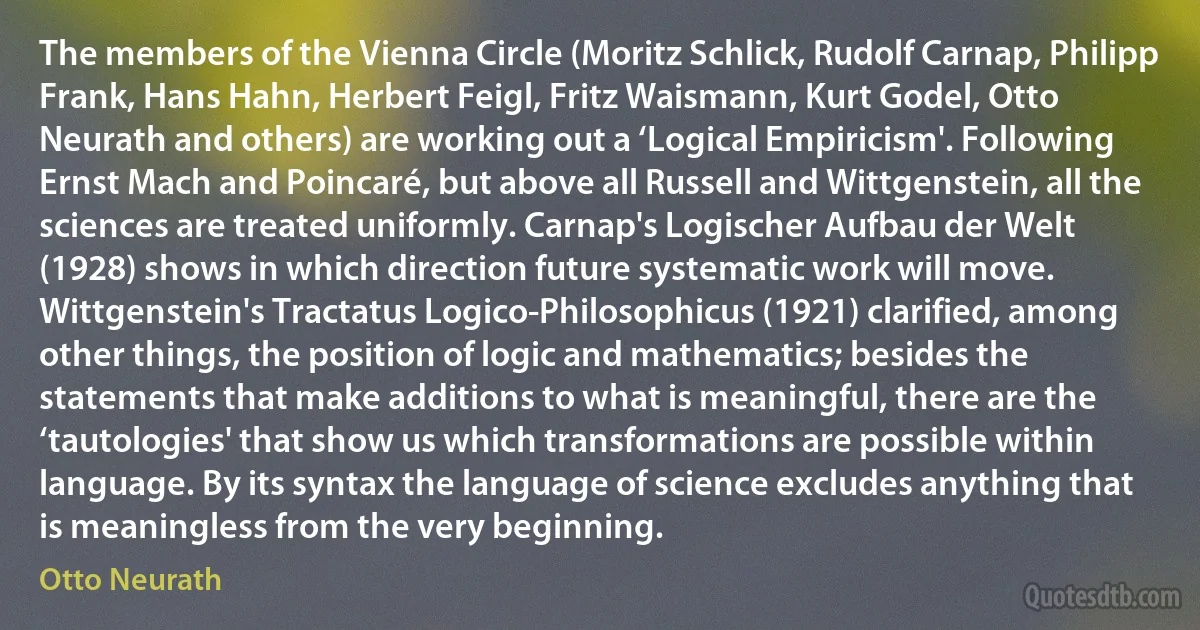
The members of the Vienna Circle (Moritz Schlick, Rudolf Carnap, Philipp Frank, Hans Hahn, Herbert Feigl, Fritz Waismann, Kurt Godel, Otto Neurath and others) are working out a ‘Logical Empiricism'. Following Ernst Mach and Poincaré, but above all Russell and Wittgenstein, all the sciences are treated uniformly. Carnap's Logischer Aufbau der Welt (1928) shows in which direction future systematic work will move. Wittgenstein's Tractatus Logico-Philosophicus (1921) clarified, among other things, the position of logic and mathematics; besides the statements that make additions to what is meaningful, there are the ‘tautologies' that show us which transformations are possible within language. By its syntax the language of science excludes anything that is meaningless from the very beginning.
Otto NeurathRelated topics
above anything beginning direction empiricism following frank future language mathematics move otto position possible science show syntax work working others russell things ernst fritz hans herbert sciencesRelated quotes
A Frenchman is self-assured because he regards himself personally both in mind and body as irresistibly attractive to men and women. An Englishman is self-assured as being a citizen of the best-organized state in the world and therefore, as an Englishman, always knows what he should do and knows that all he does as an Englishman is undoubtedly correct. An Italian is self-assured because he is excitable and easily forgets himself and other people. A Russian is self-assured just because he knows nothing and does not want to know anything, since he does not believe that anything can be known. The German's self-assurance is worst of all, stronger and more repulsive than any other, because he imagines that he knows the truth -- science -- which he himself has invented but which is for him the absolute truth.

Leo Tolstoy
For what advantage is it, that the world enjoys profound peace, if thou art at war with thyself? This then is the peace we should keep. If we have it, nothing from without will be able to harm us. And to this end the public peace contributes no little: whence it is said, ‘That we may lead a quiet and peaceable life.' But if any one is disturbed when there is quiet, he is a miserable creature. Seest thou that He speaks of this peace which I call the third (inner, ed.) kind? Therefore when he has said, ‘that we may lead a quiet and peaceable life,' he does not stop there, but adds ‘in all godliness and honesty.' But we cannot live in godliness and honesty, unless that peace be established. For when curious reasonings disturb our faith, what peace is there? or when spirits of uncleanness, what peace is there?

John Chrysostom
To appreciate the nature of fractals, recall Galileo's splendid manifesto that "Philosophy is written in the language of mathematics and its characters are triangles, circles and other geometric figures, without which one wanders about in a dark labyrinth." Observe that circles, ellipses, and parabolas are very smooth shapes and that a triangle has a small number of points of irregularity. Galileo was absolutely right to assert that in science those shapes are necessary. But they have turned out not to be sufficient, "merely" because most of the world is of infinitely great roughness and complexity. However, the infinite sea of complexity includes two islands: one of Euclidean simplicity, and also a second of relative simplicity in which roughness is present, but is the same at all scales.

Benoît Mandelbrot
A later generation could have explained the miracle to Sir Frank - though explaining in terms he would not have understood. Though he knew well enough the theory of family traits and likenesses, it would have been impossible then to make him comprehend the intricacy of a chromosome which carries inside it - not merely the stereotypes of parental hair or temperament - but the secret knowledge of how to breathe, how to work the muscles to move the bones, how to grow, how to remember, how to commence the processes of thought ... all the infinite number of secret "how to's" that have to be passed on for life to stay above jelly level.
A freak chromosome in Sir Frank ensured he passed on, together with these usual secrets, the secret of his individual consciousness.

Brian Aldiss
Even though principles of rationality seem as often violated as followed, we still cling to the notion that human thought should be rational, logical, and orderly. Much of law is based upon the concept of rational thought and behavior. Much of economic theory is based upon the model of the rational human who attempts to optimize personal benefit, utility, or comfort. Many scientists who study artificial intelligence use the mathematics of formal logic-the predicate calculus-as their major tool to simulate thought. [...] Human thought is not like logic; it is fundamentally different in kind and spirit. The difference is neither worse nor better. But it is the difference that leads to creative discovery and to great robustness of behavior.

Donald Norman
